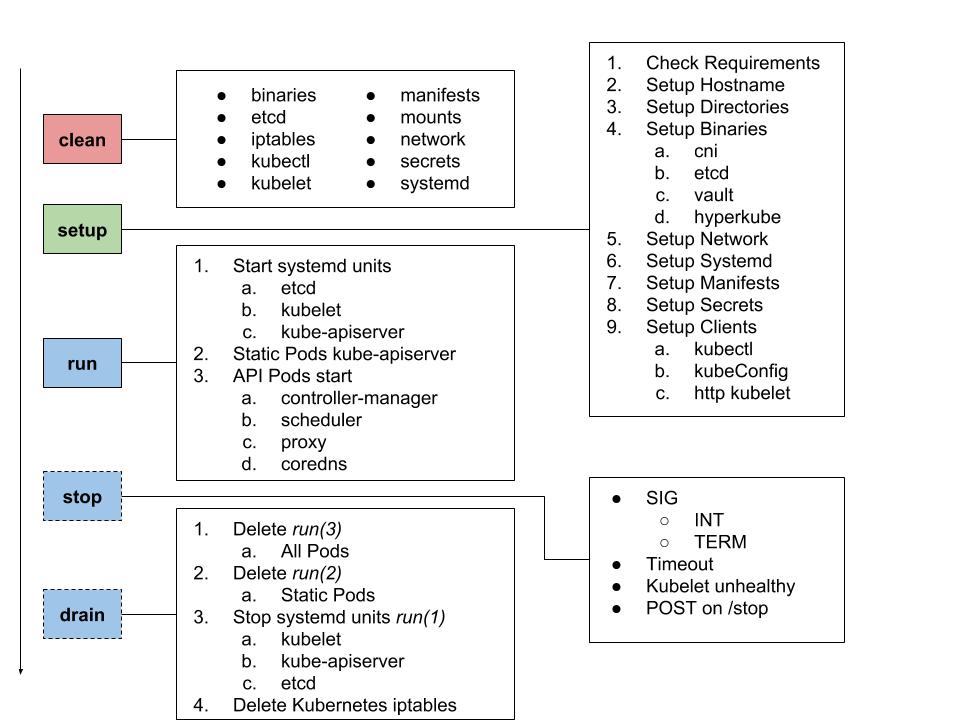Run a managed Kubernetes setup.
This project's purpose is to provide a simple Kubernetes setup to validate any software on top of it.
You can use it to validate a software dependency on Kubernetes itself or just to run some classic app workflows with argo.
As pupernetes runs in travis and circle-ci, it becomes very easy to integrate this tool in any Kubernetes project.
This project has been initially designed to perform the end to end testing of the datadog-agent.
Provides:
- etcd v3
- kubectl
- kubelet
- kube-apiserver
- kube-scheduler
- kube-controller-manager
- kube-proxy
- coredns
The default setup is secured with:
- Valid x509 certificates provided by an embedded vault PKI
- Able to use the Kubernetes CSR and the service account root-ca
- HTTPS webhook to provide token lookups for the kubelet API
- RBAC
tarunzipsystemctlsystemd-resolve(or a non-systemd managed/etc/resolv.conf)mountiptablesnsenter
Additionally any implicit requirements needed by the kubelet, like the container runtime and more.
Currently only reporting docker, please see the current limitations.
A recent systemd version is better to gain:
systemd-resolvejournalctl --since- more convenient dbus API
If running containerd, you need to add libseccomp2 on your system.
- 4GB of memory is required
- 5GB of free disk space for the binaries and the container images
Ensure your hostname is discoverable:
dig $(hostname) +shortPupernetes must be run on linux (or linux VM).
Please see our ubuntu 18.04 notes about it.
To compile pupernetes, you need the following binaries:
go1.10make
go get -u github.com/DataDog/pupernetes
cd ${GOPATH}/src/github.com/DataDog/pupernetes
makeYou need to download the last version:
VERSION=0.7.0
curl -LOf https://github.com/DataDog/pupernetes/releases/download/v${VERSION}/pupernetes
chmod +x ./pupernetes
./pupernetes --helpsudo ./pupernetes daemon run /opt/sandbox/Note:
kubectlcan be automatically installed bypupernetes.You need to run the following command to add
kubectlto the$PATH:sudo ./pupernetes daemon run /opt/sandbox/ --kubectl-link /usr/local/bin/kubectl
$ kubectl get svc,ds,deploy,job,po --all-namespaces
NAMESPACE NAME TYPE CLUSTER-IP EXTERNAL-IP PORT(S) AGE
default kubernetes ClusterIP 192.168.254.1 <none> 443/TCP 3m
kube-system coredns ClusterIP 192.168.254.2 <none> 53/UDP,53/TCP 3m
NAMESPACE NAME DESIRED CURRENT READY UP-TO-DATE AVAILABLE NODE SELECTOR AGE
kube-system kube-proxy 1 1 1 1 1 <none> 3m
kube-system kube-scheduler 1 1 1 1 1 <none> 3m
NAMESPACE NAME DESIRED CURRENT UP-TO-DATE AVAILABLE AGE
kube-system coredns 1 1 1 1 3m
NAMESPACE NAME READY STATUS RESTARTS AGE
kube-system coredns-747dbcf5df-p2lhq 1/1 Running 0 3m
kube-system kube-controller-manager 1/1 Running 0 3m
kube-system kube-proxy-wggdn 1/1 Running 0 3m
kube-system kube-scheduler-92zrj 1/1 Running 0 3mGracefully stop it with:
- SIGINT
- SIGTERM
--timeoutcurl -XPOST 127.0.0.1:8989/stop
pupernetes can start a specific Kubernetes version with the flag --hyperkube-version=1.9.3.
These are the current supported versions:
- 1.11
- 1.10
- 1.9
- 1.8
- 1.7
- 1.6 (experimental)
- 1.5 (experimental)
- 1.4
- 1.3
It's possible to run pupernetes as a systemd service directly with the command line. In this case, pupernetes asks to systemd-dbus to be daemonised with the given arguments. See more info about it in the run command.
This command line is very convenient to run pupernetes in SaaS CI:
The full documentation is available here.
Pupernetes exposes prometheus metrics to improve the observability.
You can have a look at which metrics are available here.
- Systemd
- Currently working with systemd only
- Could be containerized with extensive mounts
- binaries
- dbus
- Support for Custom Metrics
- You can register an API Service for an External Metrics Provider. This is only supported for 1.10.x and 1.11.x.

